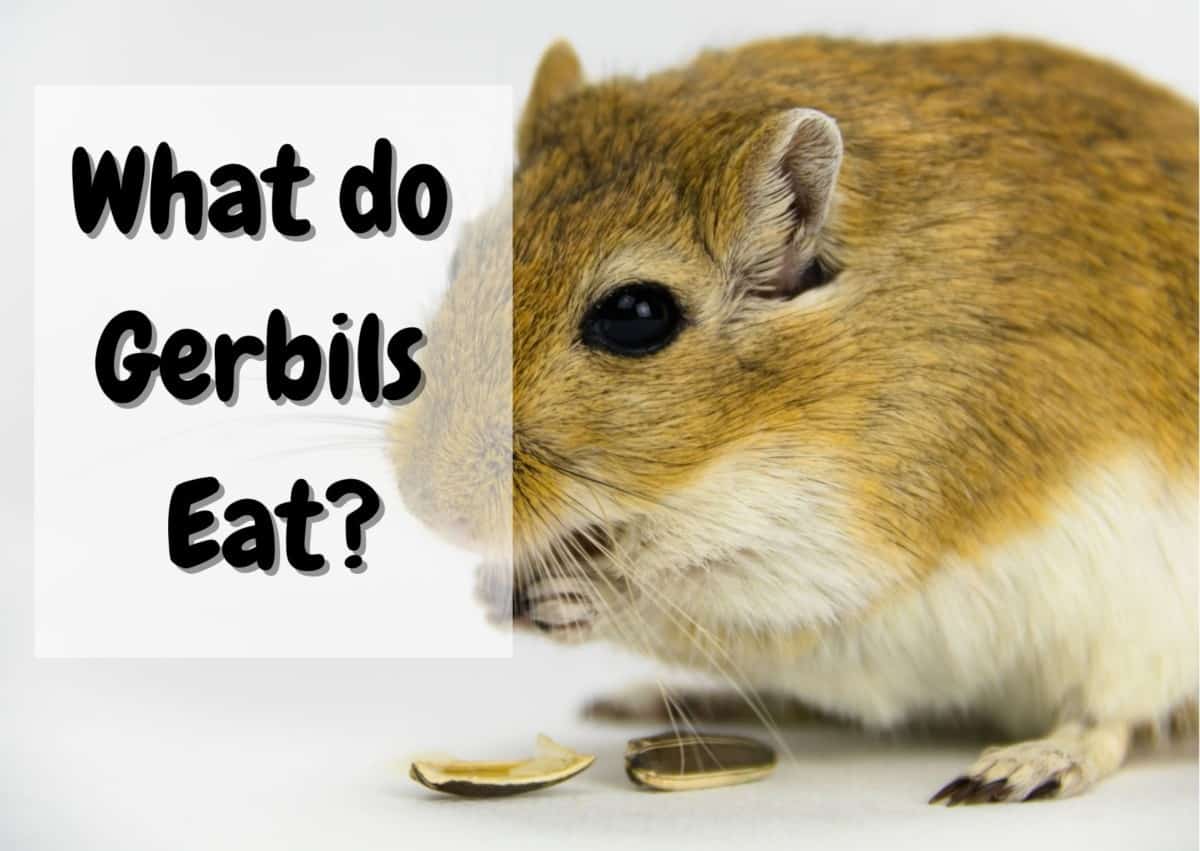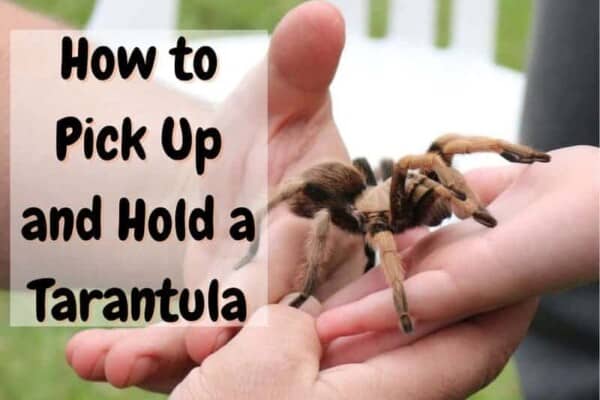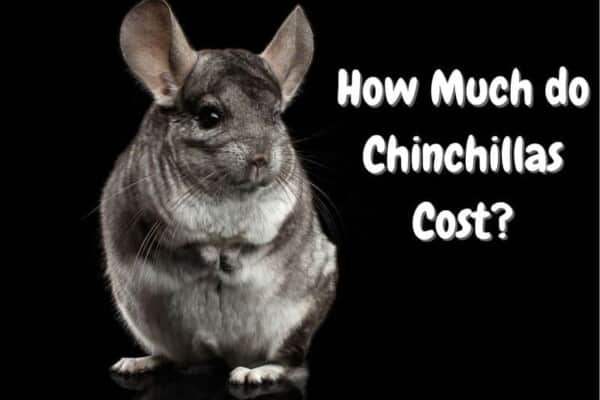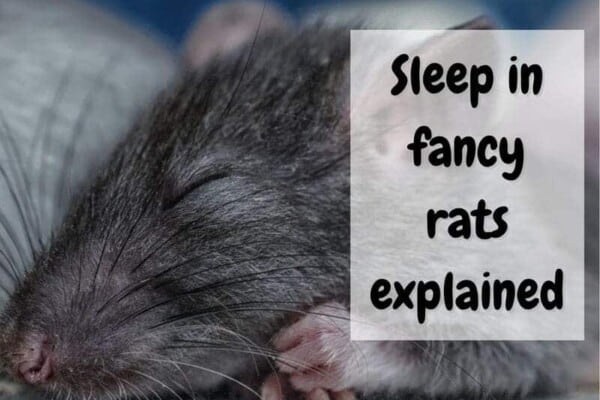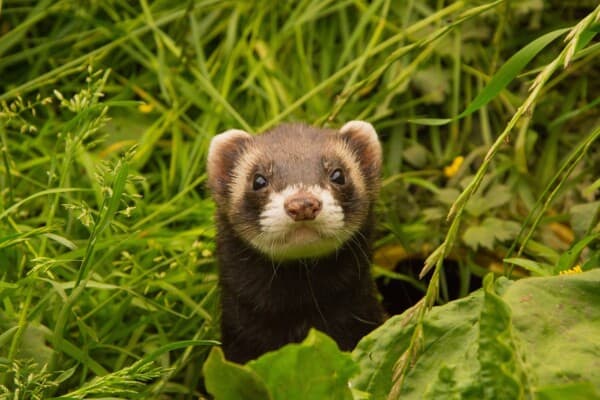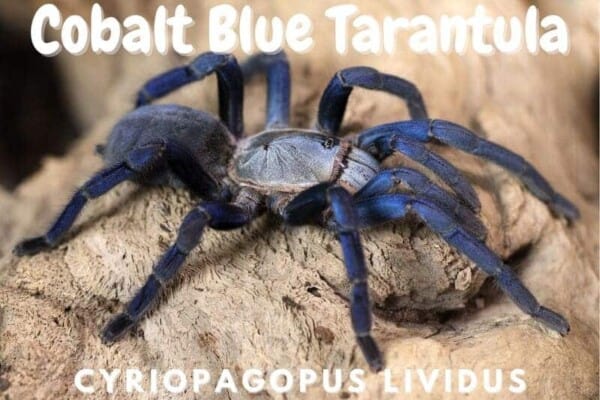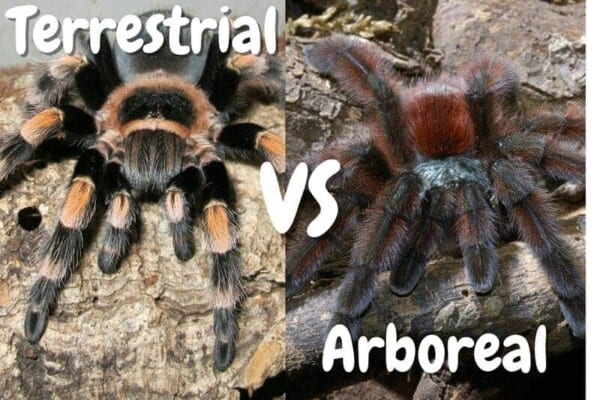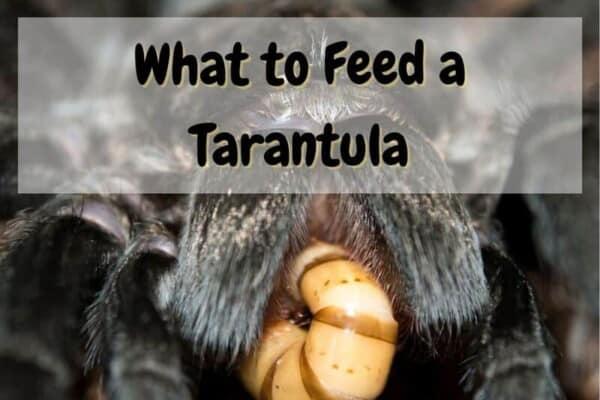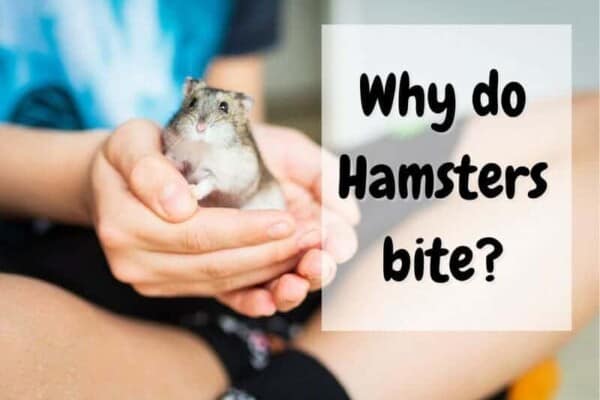Gerbil pets are called by their scientific name Meriones unguiculatus. These little rodents that originate from China lived in a habitat that is mostly sandy with plenty of grass and shrubs, enjoying dry winters followed by hot summers. What do gerbils eat if you decide to keep one as a pet?
You might think gerbils are herbivores, but they are better described as omnivores. Since they are opportunistic rodents, part of their daily intake and diet consists of plants, seeds, and meat. In this article, we will break down what you need to know about the gerbil diet. You will also discover how to make tasty treats for your critter.
What do Gerbils Eat? A Complete List
As omnivores, gerbils can eat a wide variety of food: vegetables, fruits, herbs and flowers, cereals and nuts, pellets, meat and insects, dairies, grass and hay, chewing snacks, and wood snacks. Let’s have a look at each one of these categories to better understand the food you can give your gerbils.
1. Vegetables
Here is a list of vegetables you can give your gerbils for food:
- arugula,
- broccoli,
- carrots,
- celery,
- cooked potatoes,
- cauliflower,
- corn,
- cucumber,
- endive,
- green bell peppers,
- green beans,
- leaf spinach,
- lettuce,
- peas,
- radish,
- squash,
- sweet potatoes,
- turnip,
- red bell pepper,
- squash.
2. Fruits
- apples (without seeds),
- apricot,
- banana,
- blueberry,
- cherries (no pits),
- grapes,
- honeydew,
- mango,
- papaya,
- peach,
- pear,
- plum,
- pumpkin,
- raisins,
- raspberry,
- strawberry,
- kiwi,
- watermelon (no green rind)
3. Herbs and flowers
Herbs and flowers gerbils can eat include:
- alfalfa,
- cactus flowers,
- daisies,
- Hawthorne blossoms,
- fennel,
- lavender,
- parsley,
- Rose petals,
- sage.
4. Cereals and nuts
- unsalted acorns,
- almonds,
- beechnuts,
- Brazil nuts,
- bread,
- cashews,
- chestnuts,
- corn flakes,
- cornbread,
- dried apricot,
- dry pasta,
- flax seeds,
- grass seeds,
- hazelnuts,
- oats,
- peanuts,
- pecans,
- pistachios,
- popcorn,
- walnuts,
- dog biscuits,
- sesame seeds,
- sunflower seeds,
- pumpkin seeds,
- unsweetened cereals and grains.
5. Pellets
Pellets are fine and many of the gerbil mixes have seeds mixed into the pellets. What you want to avoid are pellet blocks since these are not easy to break up, nor are they easy to gnaw on.
Try to pick a pellet that is meant for gerbils but if it mentioned hamsters, this is fine as well. Most pellet food should have a good mixture of whole grains mixed with processed hay. Their pellets need to have a specific nutritional value meant for gerbils.
6. Meat and insects
It is good to include a small amount of protein in your gerbil diet. Your gerbils will enjoy:
- cheese,
- cooked chicken,
- crickets,
- dog and cat food (dry),
- dog bones,
- dried silkworm and shrimp,
- dry grasshoppers,
- scrambled or boiled eggs,
- mealworms.
7. Grass and hay
Gerbils don’t need hay to survive since they are getting most of their energy from pellet food and other items you feed them. That’s not to say they don’t use hay to chew on since their teeth continually grow. This is why other items in their habitat are also meant for chewing including cardboard.
8. Chewing snacks
Try to avoid snack mixes that have too many dried fruits and nuts that can be too fatty or high in natural sugars. They will be happy chewing on their seed stashes and anything else they are given in their cage. Hay sticks, cardboard, and chew toys are all going to get equal attention.
9. Wood snacks
Edible wood that gerbils like includes a long list that is perfectly fine for them to chew. Here is the complete list:
- Acacia,
- Alderberry,
- Ash,
- Aspen,
- Bamboo,
- Birch,
- Cercis,
- Chinese Dogwood,
- Chinese Gooseberry,
- Dogwood,
- Elm,
- Grapevine,
- Hawthorn,
- Hazelnut,
- Horse Apple,
- Kiwi branch,
- Larch,
- Limetree,
- Longan,
- Loquat,
- Lychee branch,
- Magnolia,
- Manzanita,
- Medlar
- Mulberry,
- Oak,
- Pecan,
- Pine (kiln-dried),
- Poplar,
- Quince,
- Ribbonwood,
- Rowanberry branches,
- Sickle Bush,
- Sycamore,
- Willow.
Wood that is NOT RECOMMENDED includes:
- All Redwood,
- Almond,
- Apricot,
- Black Locust,
- Blackwood,
- Box Elder,
- Boxwood,
- Cashew,
- Cedar,
- Cherry,
- Chestnut,
- Chinese Snake Tree,
- Clematis,
- Cypress,
- Ebony,
- Elderberry Bushes,
- Eucalyptus,
- Fir,
- Ginko,
- Grapefruit wood
- Greenheart,
- Hemlock,
- Hornbeam,
- Hydrangea,
- Iroko,
- Juniper,
- Katon,
- Laurel,
- Lemon Wood,
- Limewood,
- Mahogany,
- Man-made Wood,
- Maple,
- Myrtle,
- Obeche,
- Orange Wood,
- Pine (fresh),
- Plum,
- Poison Ivy,
- Pulasan,
- Rambutan,
- Ramin,
- Rhododendron
- Rosewood,
- Sandlewood,
- Satinwood,
- Sneezewood,
- Spruce,
- Tallow,
- Teak,
- Walnut,
- Wenge,
- Yew.
Source: Guidance for the welfare of pet gerbils
Can Gerbils eat other pet foods?
To some extent, other foods can be fed to your gerbil. These are mostly dry foods that have nutritional content. Dry dog and cat food are fine, but you should never give them anything from a can.
Never give them wild bird seeds since there are seeds in there that can be toxic for your gerbil. Hamster pellets and other rodent food will also be fine for them. Hard treats like dog biscuits are fine in minimal amounts due to the content that wasn’t meant for your gerbil.
What to give to a baby gerbil for food
From the time that gerbils are at least 3 weeks old up to three months, you can give pellet mix, peeled sunflower seeds, and raw oats. This is followed by fresh veggies and fruits 2-3 times a week. The amount given per day is less than half a tablespoon, fed at least 3 times per day.
After three months you need to increase these amounts up to one tablespoon per day. You can then start to add bits of meat, dried insects, and even cooked eggs. Be sure that all portions are cut up so they aren’t considered a choking hazard. Do not overfeed them too much meat as this might lead to pup cannibalism if they happen to breed.
Gerbils diet Do’s and Don’ts
Some foods can potentially cause a gerbil more harm than good. Yet many pet care sites mention these foods are fine to give to your gerbil. The problem is that many of these foods aren’t easily digested. They can cause diarrhea or sometimes even have deadly toxins.
Don’t feed your gerbils these foods
- apple seeds,
- asparagus,
- avocado,
- basil,
- beans (legumes of any kind),
- bean sprouts,
- Brussel sprouts,
- cinnamon,
- cabbage,
- chives,
- cilantro,
- citrus peel,
- chocolate,
- clover,
- dairy products,
- fruit pits and seeds,
- garlic,
- grapefruit,
- iceberg lettuce,
- leeks,
- kidney beans,
- oranges,
- onions,
- raw potatoes,
- rhubarb,
- shallots,
- soybeans,
- toffee,
- tomatoes and their leaves,
- uncooked eggs,
- uncooked rice,
- watermelon rind,
- wild bird seed,
- zucchini seeds
These plants and flowers are toxic
Do not give a gerbil any of the following plants and flowers:
- buttercups,
- clematis,
- clover,
- coltsfoot,
- dandelion and dandelion greens,
- daffodil,
- hemlock,
- hydrangea,
- Ivy,
- laburnum,
- laurel,
- nightshade,
- poinsettia,
- oleander,
- yew,
- yucca
Only feed gerbils with fresh veggies and fruits
The biggest mistake you can make is giving a gerbil old fruits and vegetables that are not fresh. Table scraps are fine as long as they are still fresh from that day. It’s OK to give gerbils small amounts of approved veggies and fruits when you consume them too. Don’t give carrots that are rubbery and have been sitting around all week.
The same can be mentioned about fruits since older fruits will ripen after a few days and actually increase in natural sugars. It’s especially the case for bananas, peaches, and plums, and you don’t want to give your gerbil any high sugar content.
1. Obesity
Weight gain happens easily with gerbils since they don’t know when to stop eating fatty foods. You need to plan a good diet that doesn’t reward them with sweets all the time. Weight gain starts with giving fatty foods that are too high in sugar or fat content.
Most owners think that you can give gerbils sunflower seeds and dried fruits every day. It’s also highly entertaining to watch them eat these sweets, but the bad side is watching them get fat. For this reason, you have to stick to a healthy diet that gives a bit of everything to balance out your gerbil’s daily intake.
2. Toxic foods
Some gerbils might have a bad reaction to certain vegetables or fruits. But watch out for trace amounts of pesticides that are still on the surface of veggies and fruits. This is why you always have to wash them well before feeding them to a gerbil.
Since they are so small, they can have toxic reactions even in small amounts. But if there is food that does have a toxic effect, it’s often because too much of it was given.
3. Big chunks
You might be tempted to give your gerbils big chunks of veggies because it’s cute, but big pieces can easily become choking hazards. Always cut your fruits and veggies into small bite-size pieces that match the size of your gerbil.
Gerbil diet: How often, how much, and when should I feed my gerbil?
- How often: A gerbil likes to eat at least three times a day to simulate its natural foraging traits. While many owners think that dumping their food in a food dish is fine for them, too much food at one time could lead to diarrhea, and in the long term, obesity.
- How much: Gerbils can eat one whole tablespoon of pellets per day. This single tablespoon needs to be split into three parts equally. This way you can add small bits of vegetables, seeds, and fruits to that mix.
- When: You can feed them three times a day: once when you wake up, and again in the evening, and once more time before you go to sleep. It should be at least every 6 hours in between feedings. Since gerbils can alter their sleep patterns to be awake during the day or awake at night, they will eat whenever their schedule allows them.
Examples of gerbil food recipes
Gerbils like food mixes that give them a wide variety to choose from. Here are two great recipes that are healthy for them.
Gerbil snack mix #1
Add equal portions of puffed rice, puffed corn, puffed wheat, dry rice, dry cat food, and an equal portion of gerbil seed mix into a plastic container. Scoop out half a teaspoon and put this in their food bowl.
Gerbil snack mix #2
Into a cup add equal parts of barley, green and yellow dried peas, dry cat food, small macaroni, whole-grain egg noodles (crushed), raisins, and dried cranberries. This can be given as a special treat once a week.
Gerbil treats – what kind of treats can I give my gerbils?
Fruits and dried fruits are usually a great treat to give your gerbil. They should be cut up into slices that are small enough for them to hold. They should also be fresh (aside from dried fruits). Banana chips should be broken into smaller chips so they don’t become choking hazards.
How often can I give my gerbil a treat?
As most fruits and dried fruit have higher sugar content, you should only give these to a gerbil once a week. Any amount more than that will contribute to a diet that can make your gerbil gain weight. If you give veggies more often, this can be two or three times a week depending on how they like eating fresh vegetables.
What and how do gerbils drink?
Your gerbil is drinking water as their main source to keep hydrated all throughout the day. Make sure they have everything they need in their cage, for them to never get dehydrated.
Dispenser
A water bottle is the best way to get water to any gerbil habitat that you give them. Your gerbils should be able to get at least 3-5 milliliters of water per day. If you have more than one gerbil in your habitat, it’s a good idea to get a larger water bottle.
It’s best not to use a bowl since this is not good for keeping inside a cage with so much bedding material. It can also become filled with droppings by accident and get contaminated with bacteria. It also will be a danger for a gerbil to step through and can end up making them ill because their fur is wet.
How often do gerbils drink?
Full-grown gerbils have been known to drink up to 4 milliliters of water each day. Smaller gerbils will likely drink less, but a whole habitat with many gerbils living together will go through more water. It is recommended to have two water bottles in a habitat so each gerbil can get to water easily enough.
What do Gerbils eat in the wild?
Gerbils that come from the wild originally ate anything that they could find in their habitat to get their dietary requirements. This included dry grass, roots, plants, and dried flowers, as well as insects and larvae. If they have access to grains, seeds, fruits, and vegetables, they will consume these as well.
In the wild, they have a very good ability to stuff themselves to survive long periods of food deprivation. They also conserve water by producing highly concentrated urine and dry feces.
How long can a gerbil go without eating?
As frail and tiny as your gerbil is, they are very efficient at hoarding food in their cage. If they have no food showing anywhere, they usually have a food stash. It’s not until you clean their cage that you’ll find hoards of seeds and food stashed away. For this reason, you can easily let them go for one or two days without giving them food since they will be using their stashed supply. They manage their water intake too, so they don’t need water filled all the time.
Obviously, it’s a good idea to give them food each day, but if you forget once or twice, your gerbil will be ok. On top of that, a gerbil has a metabolism that is meant to live in harsh conditions. In the wild, they survive by gorging themselves to make it through the summer seasons.
If you go on vacation or a road trip for a couple of days, just add more food and water to ensure they have enough to last the days you are not at home. Obviously, it would be better to have somebody check on them if you have a roommate or friend near your home.
Related articles:
- Gerbil behavior – What is your gerbil expressing?
- The cost of owning a gerbil – A complete cost breakdown
Resources and further reading:
- Nutrient Requirements of Laboratory Animals: Fourth Revised Edition, 1995.
- Water balance and protein intake in the Mongolian gerbil (Meriones unguiculatus), Edwards BA, Donaldson K, Simpson AP
- A Healthy Diet for Gerbils, RSPCA
Contents
- What do Gerbils Eat? A Complete List
- Can Gerbils eat other pet foods?
- What to give to a baby gerbil for food
- Gerbils diet Do’s and Don’ts
- A few typical diet-related issues in gerbils
- Gerbil diet: How often, how much, and when should I feed my gerbil?
- Examples of gerbil food recipes
- Gerbil treats – what kind of treats can I give my gerbils?
- What and how do gerbils drink?
- What do Gerbils eat in the wild?
- How long can a gerbil go without eating?

